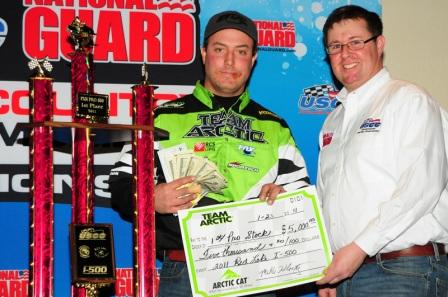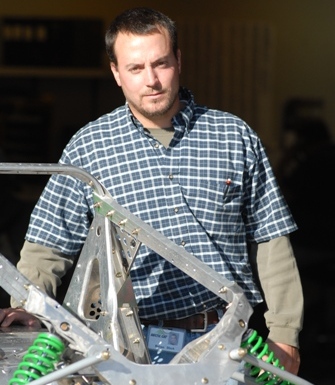
During the 2009-10 USCC cross-country racing season, Team Arctic’s Brian Dick (32) of Thief River Falls, joined the elite ranks of legendary Arctic Cat racers to score multiple class wins and the overall high-point Championship title in a single season of competition. He was named USCC Racer of the Year, his mechanic Joe Lesmiester was named Mechanic of the Year and his sponsor Christian Bros. Racing, was awarded the USCC Team of the Year.
Not too shabby!
AI: Congratulations on a remarkable season, winning three USCC races and capturing the Championship title. You’ve always been one of the top racers, but last year you brought it to another level. What did you do different?
BD: As you mentioned, I have always been close but either had mechanical or driver errors that kept me from being on top. This season, I managed to drive a little smarter, with fewer errors, so I was smoother and more consistent. Sometimes in previous seasons I’d go too fast and end up in rhubarb.
Also, my mechanic Joe Lesmeister and I were able to have the sled in top shape before each event. We also made some improvements from the previous years on the 600 Sno Pro that made the sled more competitive as well.
AI: You won one other race in your career, but that was a few years ago, right?
BD: I did win both the Pro 600 Stock and Open races in Barnsville back in 2005, so it has been a while. I managed to win quit a few of the Pro 600 Open races from then until now, but not the big show.
AI: You and your family have a long history in cross-country racing. Your dad (Paul) has raced forever, and still rips. When did you start?
BD: My dad does still rip, and he’s been a huge inspiration. My first race was back in 1992 on his 1990 EXT Special. Just a local buddy race in Grand Rapids, Minn., where I grew up. I managed to barrel role it on the first lap, right in front of my dad (laughs). I started doing the I-500 in 1997, and have been racing the USCC circuit for the past five seasons.
AI: Anything about last season that was disappointing for you?
BD: The biggest disappointment last season was having a mechanical problem on the second day of the Red Lake 500. I managed to limp the sled in but it took me out of contention.
AI: The I-500 has been particularly unkind to you.
Yeah, in 2004 I ran out of gas and had to hitchhike for 15 miles to get some, and I still ended up in second place. In 2005 I was leading by 2-3 minutes going into the last day. About 15 miles into the race I had a huge yard sale, which wrecked a bunch of stuff on my sled, and I got second place again. Then in 2006 I was in second behind Bryan Dyrdahl on the final day. His sled had major problems and he was limping it in, having to go super slow… something like 10-20 mph. Ten miles from the finish he was less than a mile in front of me, when the crank bearing on my sled went out.
Three days is a lot of time for something to go wrong, whether it’s with sled set-up or luck. I’ve had two good days at many I-500s, but never three.
AI: Who are your racing sponsors?
BD: Arctic Cat, Christian Bros. Racing, Speedwerx, Woody’s, Fox Racing Shocks, Ericco Tool, and Budweiser through Dick Distributing.
AI: Give me an honest assessment of how the Sno Pro 600 works as a cross-country sled… its strengths and weaknesses… and how it compares to the other brands’ race sleds.
BD: I can only be so honest with my current employer watching my every move (laughs). Overall, the small changes that we have done to the Sno Pro 600 since its debut in 2008, have made this sled an excellent cross-country package. It’s lightweight, with an excellent power plant and superior acceleration. We have good turning, braking and rider ergos. Our speeds seem to be on par with the competition. I will say that the 600 Sno Pro is by far the easiest to work on, and that comes from feedback of all brand racers. The front and rear suspension works awesome in the big stuff. If there is a weakness, I would have to say it’s in high-speed bumps, mainly in the rear suspension, which we have improved again for 2011.
AI: Some people say that cross-country racing should go to 500cc sleds. What’s your opinion about that?
BD: I could go either way. A lot of the races that are now shorter loops end up with big holes, so having the extra power gives the more talented riders the opportunity to get through them with somewhat of a rhythm and make up time. If we were to go back to longer loop races, I feel that the 500cc would be the way to go. I like the idea of getting the top speeds down, and also possibly getting the overall cost of racing down.
AI: Describe your job at Arctic Cat.
BD: I am the Project Engineer for the Snowmobile Chassis/Suspension group. This involves working with designers, product team managers, and fabricators to develop new chassis and suspensions systems. Half of my time is spent in the office working with designs on the computer, and the other half is spent in the fabrication shop or testing in the field. It’s a great balance for me and I work with a lot of sharp people.
AI: How does racing translate or influence your role as an engineer?
BD: Racing helps me maintain a performance mindset when working on new projects. Consumer sleds don’t always have the same demands or requirements as a race sled. By staying involved in racing, I’m able to deliver those ideas to the new concepts or designs.
Arctic Cat has always used racing as a means for development. By personally being on the seat and competing, I am able to respond to issues immediately and it helps our designs move along at a fast pace.
AI: Do you ever experiment with future snowmobile stuff when you’re racing in the Open class?
BD: We have used the open class for some “future” stuff. We ran the Sno Pro race sled engine in the Twin Spar chassis back in the 2007 season. And on the current race sled, we tested the spindle changes, front arm geometry and track drive in racing before it making it production for the 2009 sled.
AI: In a company full of humble people, you’re particularly reluctant to take any credit for stuff that you do. That said, can you tell me something on any current production sled that you played a major role in developing?
BD: Developing new products takes a huge team of skilled people. Some of the projects that I have been involved with are the rear Float shock rear suspension that we run in our M Series sleds, and some of the chassis components on the Twin Spar chassis.
I played a major role in producing the 2008 Sno Pro race sled. I was project engineer for the entire sled, working with engine guys, Steve Houle, Russ Ebert, Kirk, the plastic group, styling.
AI: Any patents with your name on them?
BD: I have a couple of patents, one on a single-tube, position sensing shock, and another for our staggered/offset carbide ski runner.
AI: What’s the theory behind the tall spindles on the Sno Pro, compared with shorter ones like on the F Series?
BD: I don’t know if I should publish the theory, but we have our reasons.
AI: First Sled?
BD: The first sled I ever rode was my dad’s 1979 el tigre 6000. The first sled that we considerd my own was a 1987 Jag AFS that we bought from Kirk Hibbert.
AI: All-time favorite snowmobile?
BD: The 2008 Sno Pro mainly because it was the first big project that I was fully-involved with.
AI: Favorite race?
BD: Definitely the I-500.
AI: Green or black colored race sled?
BD: Green.
AI: Air shocks or coil-over-spring?
BD: Air Shocks, because of their wide range of adjustabilitywithout having to dissemble them, the weight savings and minimized oil contamination.
AI: Fast ditch running or whooped-out trail like in Munising?
BD: Whooped out trails like in the Munising race.
AI: One of the craziest things you’ve ever seen or experienced in a race?
BD: I’ve had many crashes and such over the years that are crazy in their own right. But when I think back to going 118 MPH on my F6 Firecat in the 2004 Red Lake 500… that seems really crazy. Racing cross-country at 118 mph on a narrow river, where you don’t know what’s around the next corner, is pretty insane when I think about it.
AI: Tell me one good Roger Skime story.
BD: During the end of winter in 2007, when we were developing 2008 Sno Pro race sled Roger and I went out for a spin with prototype and a stock F6 that we were going to compare it with. As is usually the case, we headed to the Hwy 32 ditch near the plant for a nice, long stretch to compare speeds. I was on the prototype and Roger was on the F6.
Problem was, we took off from plant at 4pm, which was quitting time for Arctic Cat and Digi-Key (another TRF company), and all these trucks and cars are pouring out of the parking lot and heading down Hwy 32, where they can see the prototype.
We did a few drag races, and our last race was going to be in the ditch, going towards the plant. The moment we started the race, the fuel pump on the prototype popped and my sled quit. Well, Roger doesn’t see this and he just races ahead. He goes back to the plant, through the two security gates and all the way to Engineering, where he gets off his sled, goes into the plant and takes off his helmet before he notices I’m not with him.
Meanwhile, I was so nervous that people were seeing this top-secret sled, I tipped it upside down on its hood. When Roger finally came back, we tipped it right-side-up and towed it back, still in front of dozens of people. Roger didn’t bat an eye at the whole situation. (Laughter)
